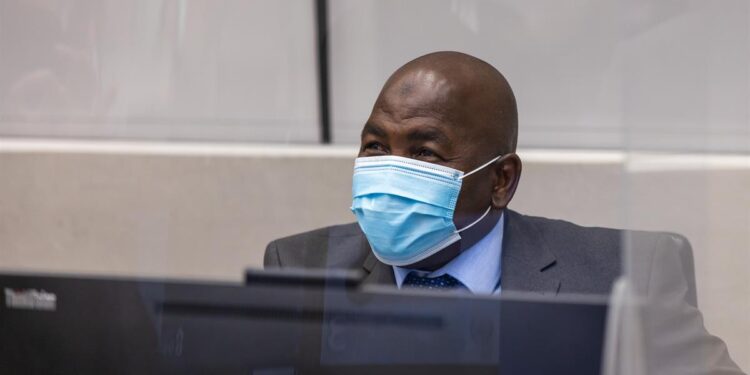Mahamat Said Abdel Kani of the Central African Republic is now all set for trial after the Presidency of the International Criminal Court constituted Trial Chamber VI and appointed three judges to hear his case.
In their decision dated December 14, 2021, Judge Piotr Hofmański (President), Judge Luz del Carmen Ibáñez Carranza (First Vice-President), and Judge Antoine Kesia-Mbe Mindua (Second Vice-President) named Judge María del Socorro Flores Liera, Judge Sergio Gerardo Ugalde Gordínez, and Judge Miatta Maria Samba to constitute the trial chamber.
Trial Chamber VI later announced that Judge Miatta Maria Samba has been elected Presiding Judge and Single Judge for the court.
The three judges of the Presidency ordered the Registrar to transmit the full record of the proceedings in Said Abdel Kani’s case before Pre-Trial Chamber II, “including the decision confirming the charges”, to Trial Chamber VI, and to notify their decision to the relevant parties and participants.
They noted that they were constituting the court under article 61(11) of the Rome Statute, “pursuant to which the Presidency shall constitute a trial chamber once the charges have been confirmed, which shall be responsible for the conduct of subsequent proceedings, and Rule 130 of the Rules of Procedure and Evidence whereby the Presidency shall refer the case to a trial chamber and transmit to it the decision confirming the charges and the record of the proceedings of the Pre-Trial Chamber”.
On December 9, 2021, Pre-Trial Chamber II partially confirmed charges against Said Abdel Kani after a confirmation of charges hearing from October 12-14, 2021, and after finding that there is sufficient evidence to establish substantial grounds to believe that the former rebel leader, being a senior member of the Séléka coalition, is criminally responsible.
Kani had seven of the 12 charges that the prosecution had brought against him confirmed against him. These include imprisonment or other severe deprivation of physical liberty as a crime against humanity at the Office Central de Répression du Banditisme (Central Office for the Repression of Banditry – the OCRB) of persons perceived to be supporters of former Central African Republic (CAR) president François Bozizé between April 12, 2013 and August 30, 2013; and torture as a crime against humanity of people perceived to be Bozizé supporters, who were tied using the arbatachar method (in which a prisoner’s four limbs were tied together behind his or her back), as well as other detainees who were severely mistreated.
Counts three and four are torture as a war crime of people perceived to be Bozizé supporters, who were tied using the arbatachar method, between April 12, 2013 and August 30, 2013, as well as other detainees who were severely mistreated; and cruel treatment as a war crime, of people perceived to be Bozizé supporters, who were tied using the arbatachar method, between 12 April 2013 and 30 August 2013, as well as other detainees who were severely mistreated.
Counts five and six are other inhumane acts as a crime against humanity of people perceived to be Bozizé supporters, who were detained in deplorable conditions at the OCRB, and who were verbally and physically abused, including during interrogations, between April 12, 2013 and August 30, 2013; and outrages upon personal dignity as a war crime of people perceived to be Bozizé supporters, who were detained in deplorable conditions at the OCRB and/or were tied using the arbatachar method, and/or were verbally and physically abused.
Count seven is persecution as a crime against humanity on political, ethnic, religious, and/or gender grounds, concerning the people detained at OCRB, based on the facts underlying counts one to six.
The chamber rejected the other five charges, also in connection with crimes against humanity and war crimes, but allegedly committed at the Comité Extraordinaire pour la Défense des Acquis Démocratiques (Extraordinary Committee for the Defence of Democratic Achievements – CEDAD), also in the Bangui, between mid-September 2013 and November 8, 2013.
Pre-Trial Chamber II’s Judge Rosario Salvatore Aitala (presiding), Judge Antoine Kesia-Mbe Mindua, and Judge Tomoko Akane committed Said Abdel Kani, who is currently detained at the seat of the ICC, for trial on the charges as confirmed.
According to court records, the government of CAR referred the situation to the ICC on May 30, 2014, saying it had persisted since August 1, 2012. Said Abdel Kani was surrendered to the ICC by the authorities on January 24, 2021, on account of an ICC warrant of arrest issued on January 7, 2019. His initial appearance before the court took place on January 28 and 29, 2021.
Led by Michel Djotodia, the Séléka were a coalition of several previously uncoordinated political factions and armed groups, including the Convention des Patriotes pour la Justice et la Paix Fondamentale (CPJP-F), predominantly composed of Muslims.
The Séléka, of which Kani was a commander, used members of the local population, known as indicateurs, to identify the houses of perceived supporters of former president Bozizé, such as retired military men, gendarmes, policemen, civil servants, or relatives. Notably, Muslims and Muslim houses were spared.
The Séléka targeted the civilian population based on religious grounds. Christians were considered supporters of the former government. Other affiliations included government employees, ethnicity, Bozizé’s Gbaya tribe, and specific neighbourhoods.
Apart from Said Abdel Kani, Anti-Balaka leaders Alfred Yekatom and Patrice-Edouard Ngaïssona are also before the ICC. Both cases arise from the situation in the Central African Republic. Yekatom was surrendered to the ICC on November 17, 2018, while Ngaïssona was arrested by the authorities of the French Republic on December 12, 2018, and transferred to the ICC Detention Centre on January 23, 2019. Their cases were joined on February 20, 2019 and hearings on witness testimonies have been ongoing from November 4, 2021.
Other cases from the violence in CAR will be handled by the Special Criminal Court in the capital Bangui.







